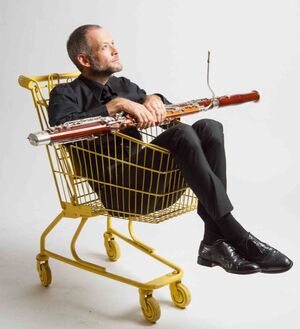 I enjoyed this interview. A member of the Berlin Philharmonic discusses his decision to leave (to leave!). Sadly, not too much dirt, but a lot to think about re career vs self. And always interesting to get a glimpse of life as a professional musician: The Berlin Philharmonic is one of the greatest orchestras in the world, playing with it a dream job for many young performers—including bassoonist Mor Biron. Growing up in a family of musicians in Rehovot, Israel (his father, Avner Biron, is the founder and music director of the chamber orchestra Israel Camerata Jerusalem), Mor Biron dreamed of playing with the Philharmonic, even if it was only for 12 seconds, “just to see how it feels.” After graduating from Jerusalem’s Academy for Music and Dance and Berlin’s Hanns Eisler Conservatory of Music, Biron received a scholarship from the orchestra’s apprenticeship program, the Karajan Academy, in 2004. After a stint as principal bassoon in Valencia, Biron joined the Berlin Philharmonic in 2007. His last performance as a member of the orchestra was on June 26, 2021 at its annual Waldbühne concert. I spoke with Biron about different perspectives of the orchestra—including arriving, departing, and the overabundance of masculine energy he encountered in between. VAN: Why did you decide to leave? Mor Biron: I felt the need to work and live in a way that aligned with my beliefs; I wanted experiences that I could grow with, that allowed for exploration. I want to keep making music, of course. But, in this orchestra, in this position, I felt like I had to make music in a certain way, one that—for me, at least—is no longer the right way. VAN:What is the right way for you? Mor Biron: I’d like to find a more feminine side of the artform—a softer, more delicate side. I want to work with people who are motivated by moving audiences, not by furthering their careers. Sure, I also wanted to have a career myself, and I got as far as I could. I’m grateful that I had the drive and energy for that and, as long as there’s something left of it, I’d like to put that energy towards other things now. VAN: Why were you not able to find that feminine side with the Philharmonic? Mor Biron: There’s a lot of masculine energy in the orchestra, which in turn is because there aren’t enough women in the orchestra. There aren’t enough feminine vibes in the individual sections. Recently, I went to a Philharmonic concert with my parents. For so many years, I watched and listened to the orchestra—onstage and off, in the concert hall and on the Digital Concert Hall. But this time, that lack of feminine energy hit me really hard. I saw this semicircle of men sitting there, and it didn’t matter what they did or how they played, all I saw was this male energy. I looked at my father and asked him, “Do you see it, too?” VAN: We know each other a bit personally through mutual friends. Whenever I saw you in the orchestra, either in concert or backstage afterwards, I got the sense that you didn’t really fit in. Was there any truth to that? Mor Biron: You’re not the first person to say that. [Laughs.] VAN: Was the decision to leave a process, or was there one decisive moment? Mor Biron: It was the kind of process where the decisive moment was instinctual. You’re running and running, and at some point you come to the cliff and you jump. The jump was quick—it only took a few minutes to write my resignation letter. But to arrive at that moment, that took me a few minutes plus my entire life. There wasn’t any long period of suffering or anything like that. In September 2019, I took a one-year sabbatical. I wanted to find out what “Mor minus the orchestra” was like, what was left of me. And, as it turned out, there was a lot. I was free to just do my thing. In the beginning, I barely played the bassoon. I traveled across Thailand. It was wonderful. When I came back from sabbatical last year, I wondered what could replace playing with the orchestra and applied for two professorships. But then I realized it was too soon—giving up one big thing and moving right into another. I knew I had to let go completely in order to make space for real change. VAN: How did your colleagues react? Mor Biron: I got a lot of compliments. I still get them today. Some say they’re proud of me, how brave my decision was.… All I did was write a letter. But we appreciate it when someone takes their life into their own hands, even though that isn’t the easiest road to take. Other colleagues didn’t really know how to deal with me or my decision. VAN: During the pandemic and resulting lockdowns, many freelance musicians were plagued by financial insecurity. You left a steady job. Mor Biron: I know. On the other hand, if I know that I don’t belong there anymore, that I don’t want to spend the rest of my life there, then I’d rather give that seat to someone who really wants to sit there. My story was that, from an early age, all I wanted was to play in this orchestra. My father is a conductor and founder of the Israel Camerata. I’ve been part of this world for as long as I can remember, all the concerts and recordings. Back then, there was a live broadcast every Thursday from the Philharmonie. When I was about nine years old, I watched the Berlin Philharmonic in concert with Abbado. I told my father, “I’d like to sit in this orchestra for 12 seconds, just once in my life. Just to see how it feels.” I could hear the difference between what came in through those television speakers and the other music around me. Well, be careful what you wish for: I wished for 12 seconds and got 17 years. [Laughs.] VAN: When did the dream start to fade? Mor Biron: I don’t see it as fading. There were evenings with the orchestra where I’d come home, complain about everything, and think, I can’t play there anymore. And then the next night, we’d have a concert that I’d thoroughly enjoy.… Which experience should I base my decision on? It took time, seeing these experiences come and go and repeat themselves, before I realized I couldn’t find any of the answers in my experiences–I had to find them in myself and make my own decision. When I was young, I struggled with making decisions, I never felt secure enough in them to swim against the tide, even if I knew it was right. Now, I have this security. VAN: Is it hard to grow old in an orchestra without it becoming routine, or without becoming cynical or bored? Mor Biron: You can just leave. No one will stop you. The stability, the financial security……the fear of losing equilibrium. For years, I’ve enjoyed leaning into awkward or embarrassing moments. That’s also why I love working with kids. VAN: You played under Simon Rattle as music director for 11 years. Now, Kirill Petrenko is ushering in a new era. That couldn’t change your mind? Mor Biron: No. Ten years ago, I had the chance to audition for a seat with the Israel Philharmonic. I remember thinking, “No, I won’t take the audition. I’m not finished with Berlin. I still want to learn a lot here.” Not many people are willing to take this kind of risk. Sometimes there are musicians who leave the orchestra to pursue a different career path, like former concertmaster Guy Braunstein. But even musicians with solo careers, like Andreas Ottensamer and Albrecht Mayer, usually stay in the orchestra. Because their solo careers wouldn’t have come close to what they are today without the orchestra. It’s the same for me. I arrange my own concerts now. I love soloing with and playing in orchestras, chamber music, jazz, improvisation. But I’m not looking for the next career. VAN: What were the highlights of your time with the Philharmonic? Were there any concerts with the perfect combination of conductor and composition? Mor Biron: One of the concerts where I can remember almost everything, as some say about playing Mahler 9 with Abbado, was “La Valse” with François-Xavier Roth. I’d never experienced something like that before, and will never experience anything like it again. The interpretation, the energy, the results… The orchestra was beaming. The musicians smiled as they played! He managed to break everyone out of their routines and set them free. Of course, it’s also nice to play the bassoon solo in “The Rite of Spring.” There was the “St. Matthew Passion” with Simon [Rattle], the Verdi Requiem with Muti. But then again, it’s Muti. How can you take him seriously? [Laughs.] VAN: You also play in the West-Eastern Divan Orchestra. What’s different about that? Mor Biron: Everything. It’s fun. We’re not just playing through our schedules.… Barenboim doesn’t exactly have a lot of feminine energy either. [Laughs.] But what I’ve learned from him is that playing in an orchestra means doing two fundamental things at the same time: listening and communicating. The better you are in both areas, the better you are as a musician and as a person. Barenboim was the first person to articulate this so clearly to me, 16 years ago in Pilas, near Seville. In any orchestra, not just mine, people don’t talk to you during your trial period. But they keep track of every mistake and, if you don’t get better: Ciao. VAN: You teach a lot, as well. Is there any advice you would give to students who are just starting out with an orchestra? Never forget that you didn’t get this job because they wanted you. You got this job because you wanted it. You offered yourself and they took you. You can always pack up and leave. It’s important for us to remember that we’re free to make any decision we want at any moment in our life. VAN: Where are you going next? Part of me wants to go back to Israel because of my family, my girlfriend, the sea, my grandmother… I moved away in 2004, when I was in my early 20s, and I’ve never lived there of my own volition. But it’s more important to wake up with a smile knowing that I’m exactly where I want to be. ¶
1 Comment
|
|

 RSS Feed
RSS Feed